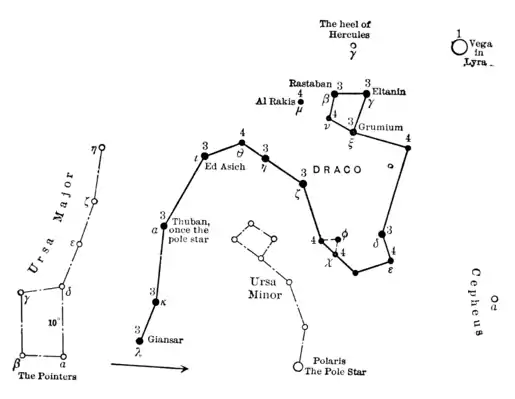DRACO (dra'-ko)—THE DRAGON. (Face North.)
Location.—About 10 degrees from (α) Ursæ Majoris—from (α) to (δ) is 10 degrees—slightly south of, that is above, the line from (α) to Polaris, is Giansar, (λ) in the tip of the Dragon's tail. Above (λ), and almost inline with it, are two more stars in Draco, which form with two stars in Ursa Major a quadrilateral. (See diagram.) Draco now curves sharply eastward, coiling about the Little Bear as shown, then turns abruptly southerly, ending in a characteristic and clearly defined group of four stars, forming an irregular square, representing the Dragon's head. This group is almost overhead in the early evening in summer. The star in the heel of Hercules lies just south of the Dragon's head. The brilliant Vega will be seen about overhead, 12 degrees southwest of the Dragon's head. Eltanin, one of the Dragon's eyes, is noted for its connection with the discovery of the law of aberration of light It is of an orange hue, while the star (β), near it, is white. Note Thuban, once the Pole Star, at one corner of a quadrilateral that Draco forms with Ursa Major.
Thuban could be seen by day or night from the bottom of the central passage of several of the Pyramids in Egypt.
The rising of Eltanin was visible about thirty-five hundred years B.C. through the central passages of the temples of Hawthor at Denderah.
